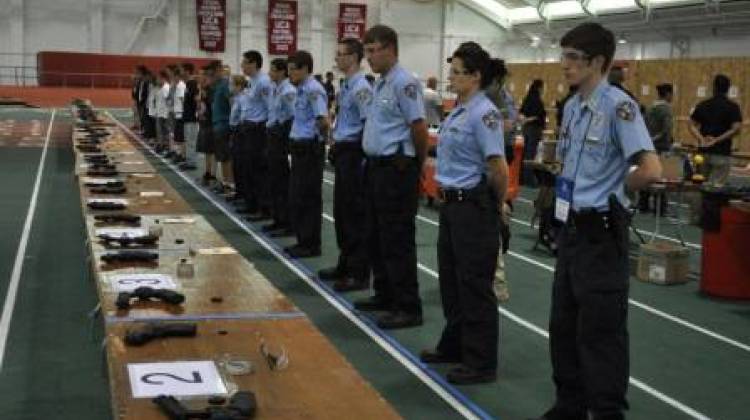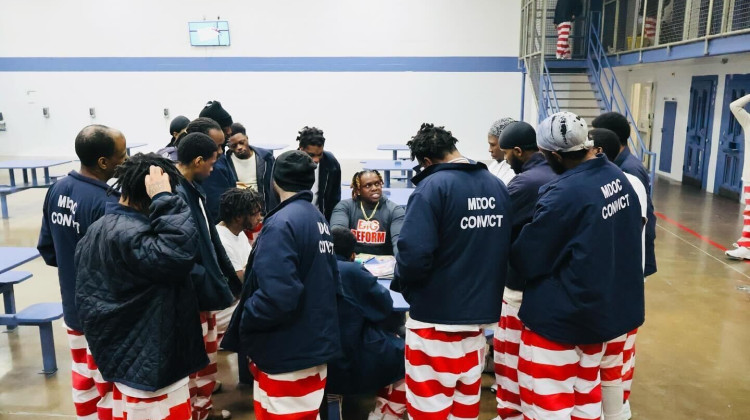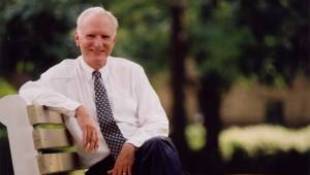
Members of Noblesville's Police Explorer Post #103 before an air-pistol shooting competition.
Terry Heifetz/IGRLucas Chisham steps into a dark room; a projector casts the only visible light onto a screen. He holds a mock gun with a laser sensor and stands on an “X” made of tape. A voice fills the room, informing him that he’s now a border patrol agent working his post. On the screen, a car pulls up to a crossing. Chisham asks the driver to open his trunk. At first the man refuses.
Then, he reluctantly agrees.
As the driver lifts the trunk, another man pops out aiming a shotgun right at the young agent. Chisham doesn’t hesitate and fires three rounds. The shots reverberate through the room. The would-be shooter collapses into the trunk.
The men weren’t real, of course—just part of a “shoot/don’t shoot” training simulator. And Chisham, 15, isn’t a border patrol agent but a member of Police Explorer Post 103 from Noblesville, part of a program for high-school-aged youths interested in policing careers. He says he was nervous before stepping into the simulator but feels the Law Enforcement Explorer program has prepared him for this type of thing.
“First you have to analyze the situation and see what kind of weapon they have,” Chisham says. “You have to see if they’re posing a threat, and if they look like they’re going to cooperate with you. So, that split second that they start reaching for the weapon or they raise it or they start lunging at you—that’s when we have to take action.”
Last week more than 2,000 young men and women, including Chisham, convened in Bloomington, Ind. for the 2014 National Law Enforcement Explorers Conference. The gathering, consisting of workshops and skills competitions, gave Explorers an interactive training experience.
At the local level, each post adviser is a law-enforcement professional helping teens understand what a law-enforcement career is like through activities like ride-alongs, firearm training and traffic direction. But at the national conference instructors include law-enforcement officials from across the country—representatives from the federal Drug Enforcement Agency and Secret Service to state and local officers.
"Every Situation is Different"
Many of the Explorers, although not even out of high school, already have their sights set on a police career. That’s why the man running the simulator, Bobby Drinkwater, who’s an instructor with the Federal Law Enforcement Training Center, says an important part of this conference is preparing future officers how to react in dangerous circumstances.
“One of the things I try to put towards the young folks is that everybody you deal with is a different scenario, different situation,” he says. “So you have to take all of the evidence that you have in front of you and make good decisions based on that.”
Drinkwater also says it’s crucial that officers learn to adjust mentally to various situations, so that mental assets on one call don’t become mental baggage on another.
“You find yourself in a position where you just left a group of people that was very volatile, and then you come across an issue and you have to check yourself,” he explains. “You find yourself still fairly aggressive, and you have to look at your own self periodically and slow yourself down. Every situation is different.”
Finding the Balance
And confronting danger is a big part of the job, and sometimes a dangerous situation can turn tragic.
Daryl Trackwell is also an instructor with the Law Enforcement Training Center. He’s also a forty-two-year law enforcement veteran. He says one thing his long career has taught him is that you can teach protocol, but you can’t convey to young officers how to process the darker things they’ll see.
“You can’t teach them tragic things that they’re going to see,” he says. “There’s no way you can teach it. It’s part of the unknown. It’s part of something you have to experience out there.”
Still, he says, those tragedies are few compared to the good things about the job that happen every day.
“To assist somebody, or help somebody where the reward is a smile or the hugs that you get, or even…somebody buys you a cup of coffee,” Trackwell says. “That’s the best part. That is the best part. Meeting the people who really appreciate your sacrifice.”
And back outside the simulator, Lucas Chisham says the balance between being one who protects and one who assists is what draws him to the field.
“I as a child always wanted to become a police officer. Just, you know, you go to work and it’s something different,” he says. “You go one day and you’re dealing with an issue, and the next day you’re helping someone buy groceries.”
 DONATE
DONATE






 View More Programs
View More Programs



 Support WFYI. We can't do it without you.
Support WFYI. We can't do it without you.